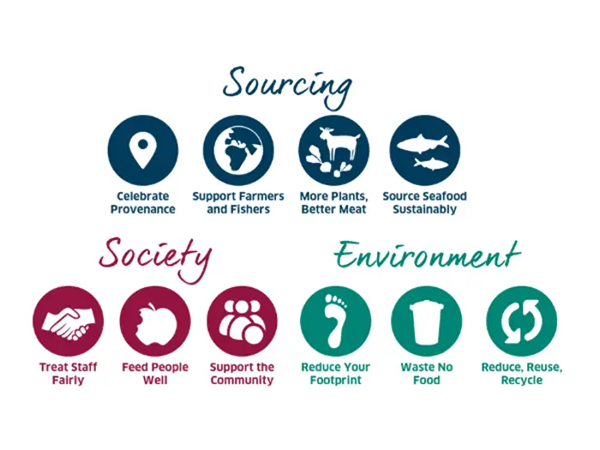Waste management and recycling
Publishing date: October 2023
Reducing, reusing, recycling and waste management
As a business, we aim to minimise waste and maximise recycling. Our target is to recycle 95% of recyclable waste.
The pubs and head office segregate waste into a minimum of seven streams: glass, tin/cans, cooking oil, paper/cardboard, plastic, lightbulbs and general waste.
In addition, food waste is also separated and sent for anaerobic digestion.
Draught beer and ale are supplied to pubs in barrels which are returned to the brewery for cleaning and reuse.
Some draught cider, wine and soft drinks are supplied in a bag-in-a-box. After the contents have been dispensed, the plastic bag and cardboard box can be separated and sent for separate recycling.
Any remaining non-recyclable waste is sent to waste-to-energy power plants which use it as a fuel to generate low-carbon electricity and/or heat, as an alternative to using fossil fuels.
Wetherspoon has a national distribution centre for food, some bottled drinks and non-consumable products.
It also includes a recycling centre. When making deliveries to pubs, lorries collect mixed recycling, used cooking oil, textiles and aluminium for return to the recycling centre – so reducing the company’s carbon footprint via reduced road miles.
During the financial year 2022/23, the pubs sent 9,911 tonnes of waste to the recycling centre,
a decrease of 770 tonnes, or 7%, on the previous year.
Used and returned cooking oil is converted to biodiesel for agricultural use.
The volume of paper used to print menus and other marketing materials has reduced in the last three years, partly through improved management at pub level and also changing customer habits.
In 2021, the total weight of paper used for all print and literature was 1,578 tonnes. In 2022, this reduced by 33% to 1,063 tonnes.
All paper is purchased in partnership with Forest Carbon (
www.forestcarbon.co.uk) which invests in new woodland and peatland restoration projects. In partnership with Forest Carbon, over the last four years, more than 3.85 tonnes of additional carbon have been captured from the atmosphere as a result of planting new woodlands and peatland restoration.
No waste is sent to landfill.
Water waste
Water usage is monitored across all pubs and head office. Where possible, we install low-flow
or push-button taps, along with toilets requiring less water to flush.
We are trialling data management systems which help to pinpoint unexpected changes in water consumption – which may indicate a change in behaviour or a supply leak.
Reducing food waste
- Sustainable Restaurant Association (SRA) 2018 awards ‘waste no food’
Several initiatives have been implemented to reduce food wastage, including preparation waste
and plate waste.
All pubs segregate food waste, which is then collected and sent for anaerobic digestion.
Some meals are available in a smaller portion size, suiting customers seeking a lighter meal.
Any unwanted, yet fit-for-consumption, food is donated to our charity partner FareShare, which distributes it to food banks, community centres and/or others in need.
Take-away packaging
The company does not routinely advertise food to take away, although some customers may request to do so, either as a whole meal or as a ‘doggy bag’.
Plastics
The company has set the following targets by 2025:
• 100% of plastic packaging to be reusable, recyclable or compostable
• 70% of plastic packaging to be effectively recycled or composted
• 30% average recycled content across plastic packaging
• Action, through redesign, innovation or alternative (reuse) delivery models,
to eliminate problematic or unnecessary single-use plastic items
Single-use plastics
Plastics can have a place. They can protect products from damage and contamination, increase food shelf life and, since they are usually lightweight, create lower transport emissions than would heavier materials. Our approach focuses on two areas:
• Removing unnecessary single-use plastics which can be avoided
• Waste management of plastics – aim for 100% recyclable, reusable or compostable
To date, the following steps have been taken to reduce single-use plastics’ use:
• Plastic straws – removed in December 2017 and replaced with 100% biodegradable and 100% recyclable paper straws and wrappers. Customers can self-select a straw, if required, rather than automatically being given one each time.
• Plastic water bottles – complimentary water fountains are available in all pubs. Alternatives to the current single-use plastic bottles are being reviewed.
• Plastic packaging – we are working with our major suppliers and with the support of the
Waste & Resources Action Programme (WRAP) and the
Sustainable Restaurant Association (SRA) to reduce and, where possible, remove the use of plastic packaging for food. Plastic containers used in the kitchen are now reusable – and cling film use has ceased.
• Plastic milk cartons – these are segregated and recycled separately. Coloured lids have been replaced with clear recyclable lids. We are working with our dairy supplier to replace plastic milk cartons with
bag-in-a-box milk, so using less plastic packaging.
• Disposable coffee cups – the majority of hot drinks sold in pubs is consumed on the premises, including unlimited complimentary refills, all served in a china mug!
Other waste
Toxic emissions and waste
The company does not create any toxic emissions or waste.
Electronic waste
Electronic waste items are disposed of safely using specialised contractors.
Ecobox
Where possible, computer equipment is sent to suppliers to refurbish and reuse.
Any disposal is compliant with the EU Waste from Electrical and Electronic Equipment (WEEE) directive.
On construction sites, there is a site waste management plan, managed by the main contractor and
covering all site waste disposal.
Sustainable Restaurant Association (SRA)
https://thesra.org

The company works with the SRA, a not-for-profit membership organisation, based in the United Kingdom, which helps food-service businesses to work towards sustainability in their sector and guides customers towards more sustainable choices.
All members have a sustainability rating across three areas: sourcing, society and sustainability. The overall rating ranges from no stars (lowest) to three stars (highest). The company currently has a two-star rating.
An application for reassessment was submitted in January 2024.